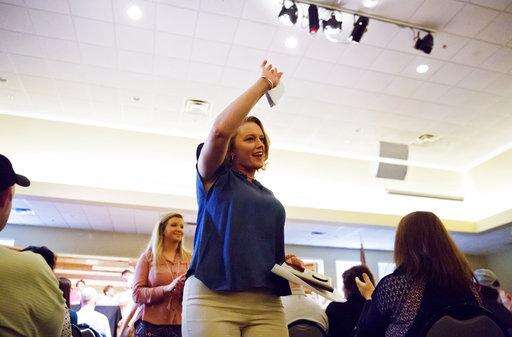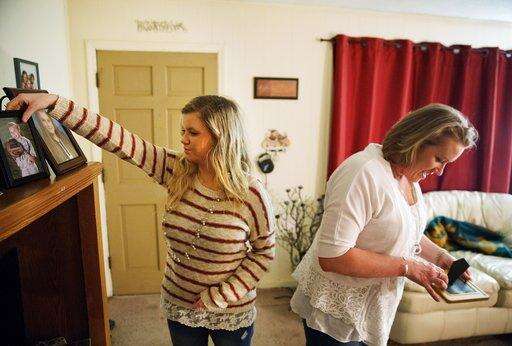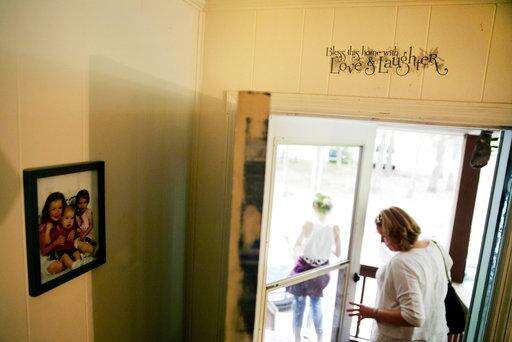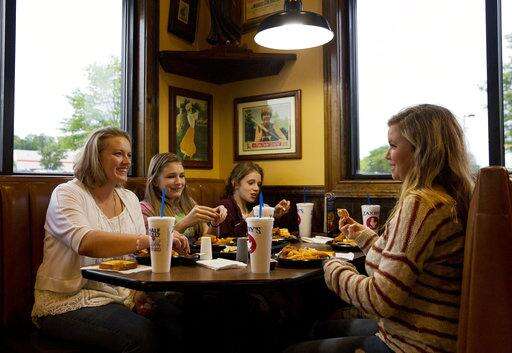Kim Silvers, left, hugs her daughter, Emily, while speaking during a graduation ceremony from the Appalachian Judicial Circuit family drug court program in Ellijay, Ga., Tuesday, April 11, 2017. "I went into this program and I was kid-less, jobless, broken, I didn't have anything," said Silvers, her eyes moist. "It was the hardest thing I've ever had to do. But it is the most rewarding." Without it, she said as her daughters stood behind her, "I would be dead right now." (AP Photo/David Goldman)
The Associated Press
ELLIJAY, Georgia (AP) - The First Baptist Church auditorium was filling with an expectant crowd, friends and family who had been through so much. Kim Silvers' three young daughters were there, all dressed up and eager for the graduation, hoping to mark the end of years of heartache visited on them by their mother's addiction.
They had begged her to stop using opioids and heard her promise to do so, only to break that vow repeatedly. They'd cried when she abandoned them, and again when they were sent to different foster homes. Then their mother enlisted in a rigorous court-run treatment program - her best, last chance to avoid permanent loss of her children.
On this Tuesday evening, the program's culmination was at hand. The would-be graduates just had one final duty: providing another batch of urine samples to be drug-tested.
Across the United States, the opioid epidemic has triggered a surge of children removed from the custody of addicted parents. Georgia's foster care population soared from about 7,600 in September 2013 to more than 13,700 as of August. Parental substance abuse now accounts for about 40 percent of the state's foster care entries.
In response, family drug courts like the program Silvers entered have been spreading. There are now roughly 450 such programs across the U.S., says Phil Breitenbucher of Children and Family Futures, but they still reach less than 20 percent of the population that needs them.
Silvers says drugs so consumed her life that she'd likely be dead without this type of help - the constant monitoring and testing, curfews and court appearances, mandatory classes, jail time for infractions.
"I knew I had to do this for my girls," she says.
Substance abuse cast a shadow on Silvers' life from girlhood; both her parents were alcoholics. By the time she turned 22, Silvers and a boyfriend were parents to three little girls: Emily, Kelsey and Allison. She started drinking heavily herself after Allie, her youngest, was born in 2005. After Silvers shattered her pelvis in a drunken fall, a doctor prescribed a painkiller containing the opioid oxycodone. Addiction followed.
Emily, her oldest, remembers a mother who often seemed drowsy, sometimes drooling. "I didn't want to see her like that," she says, "and to see my sisters, how they were sad."
On school days, Silvers would often rouse herself from bed to find that Emily, then about 11, had woken the younger girls, organized breakfast, and gotten everyone on the bus to school. "I just wanted to be a kid," says the girl, now 16.
Silvers would promise to stop using, then indulge again. She moved in with a relative who kept her supplied with painkillers, leaving her daughters with their paternal grandmother, who eventually called child welfare. The girls were placed in different homes; Allie moved around 14 times in all, and saw her mother only about once a month.
When the state threatened to terminate her parental rights, Silvers entered the Appalachian Judicial Circuit's treatment program that very day - on March 17, 2014.
The goal of the two-year program is simple, yet hard to achieve: to stop substance abuse by parents at risk of losing permanent custody of their kids.
"We call it a voluntary program, but if the state has your children, it's not completely voluntary," says Judge Jan Wheeler, who oversees the effort.
Participants sign a contract binding them to 32 commitments. They must get a job and attend training classes. Early on, there's a 7 p.m. curfew. Random drug tests are frequent.
Lapses bring sanctions, up to possible expulsion. Along with its 93 graduates over the years, the Georgia program has had 98 cases where participants quit or were expelled.
After a year, Silvers regained custody of her daughters. But there were logistical stresses and other setbacks.
At one point, some friends suggested she try kratom, an herb with opioid-like properties that is legal but forbidden under drug court rules. When a lab test discovered it, Silvers confessed and remained in the program. But as she neared its final phase, she relapsed with kratom again. The trigger, she says, was discovering that Allison had been mistreated in her last foster home.
Silvers penned a remorseful letter to Judge Wheeler, but the court ordered a third year in the program, plus 15 weekends in jail.
Behind bars, Silvers realized she'd come too far to quit. She sought treatment for depression; she and the girls went to counseling sessions.
This past spring, at graduation, Silvers took the stage, thanking her daughters and friends for their support.
"This is the first day of the rest of my life," she told the crowd.
Emily is just grateful to finally have her mom back. "I love waking up and she's always, like, 'Get up! Go to school!'" she says. "I don't want to get up, but I love hearing her voice."
Seven months after the graduation, 34-year-old Silvers is now branch manager at a credit union, and says all three daughters are doing well in school.
"Every day is not perfect," she says. "But we are grateful for how far that we've all come."
___
Associated Press writer Alex Sanz contributed to this report from Ellijay and Jasper, Georgia.
David Million wipes a tear while listening to his fiancee Kim Silvers speak at during a graduation ceremony from the Appalachian Judicial Circuit family drug court program in Ellijay, Ga., Tuesday, April 11, 2017. One of the most dramatic increases of children being taken into foster care has been in Georgia, where the foster care population soared from about 7,600 in September 2013 to more than 13,300 this spring. (AP Photo/David Goldman)
The Associated Press

A cake is presented to graduates of the Appalachian Judicial Circuit accountability court program, which includes family drug court, before a ceremony at the First Baptist Church in Ellijay, Ga., Tuesday, April 11, 2017. There are now roughly 370 such programs across the U.S., according to Phil Breitenbucher of Children and Family Futures, a California-based research and consultancy organization. But he said those programs, although successful in boosting parents' commitment to treatment and reducing children's stays in foster care, reach less than 10 percent of the population that needs them. (AP Photo/David Goldman)
The Associated Press

Kim Silvers waves to acknowledge applause after speaking during a graduation ceremony from the Appalachian Judicial Circuit family drug court program in Ellijay, Ga., Tuesday, April 11, 2017. All three of Silvers' daughters were removed from her care as she battled her addiction to opioid painkillers. The oldest, Emily, was placed with relatives; the two youngest, Kelsey and Allison, were in foster homes for more than a year before Silvers was deemed fit to take them back. (AP Photo/David Goldman)
The Associated Press

The sun sets on the First Baptist Church steeple as a graduation ceremony for the Appalachian Judicial Circuit accountability court program, which includes family drug court, takes place inside in Ellijay, Ga., Tuesday, April 11, 2017. The state says parental substance abuse now accounts for about 40 percent of foster care entries; it's been a struggle to provide enough foster homes for these children and keep caseloads at a manageable level for child-protection workers. (AP Photo/David Goldman)
The Associated Press
Group meeting members gather for an Appalachian Judicial Circuit accountability court program which includes family drug court in Jasper, Ga., Thursday, April 27, 2017. (AP Photo/David Goldman)
The Associated Press
Family Treatment Court coordinator Lexxaus Stanley conducts a urine drug test during a group meeting in Jasper, Ga., Thursday, April 27, 2017. Participants sign a toughly worded contract holding them to 32 commitments, and warning that violations will bring sanctions ranging from community service to expulsion and jail time. Early in the program, there's a 7 p.m. curfew. It later eases to 9 p.m., and is lifted for the final phase. Random drug tests are frequent, often five or six times a week. (AP Photo/David Goldman)
The Associated Press
A message decorates a desk during a group meeting for the Appalachian Judicial Circuit accountability court program in Jasper, Ga., Thursday, April 27, 2017. Over a decade, 93 of its participants, less than half of the total that entered the program, have made it through to graduation after at least two years of judicial reviews, counseling, and a busy schedule of evening classes and therapy sessions. (AP Photo/David Goldman)
The Associated Press
A billboard for a drug addiction service stands on the side of the road near Jasper, Ga., Thursday, April 27, 2017. Across the United States, the opioid epidemic, and other types of debilitating substance abuse by parents, is fueling a surge of children being taken into foster care. (AP Photo/David Goldman)
The Associated Press
Kelsey Silvers, center, sits next to her sisters, Allison, left, and Emily, while waiting for their mother Kim to finish an interview at a park in Jasper, Ga., Wednesday, May 3, 2017. All three of Silvers' daughters were removed from her care as she battled her addiction to opioid painkillers. The oldest, Emily, was placed with relatives; the two youngest, Kelsey and Allison, were in foster homes for more than a year before Silvers was deemed fit to take them back. (AP Photo/David Goldman)
The Associated Press

Kim Silvers, right, and her daughter, Emily, look through family photos at their home in Jasper, Ga., Wednesday, May 3, 2017. As she embarked on the program, Silvers was able to have supervised visits with her daughters. "I didn't miss a single visitation, but even though I was there every time, it took them a while to start trusting me," Silvers said. "I had made so many broken promises, told so many lies." Emily said the toughest part for her was being separated from her sisters. "I couldn't be a role model for them," she said. (AP Photo/David Goldman)
The Associated Press
Kim Silvers, background right, sits in her car with daughters, Emily, right; Kelsey, left, and Allison, rear, in Jasper, Ga., Wednesday, May 3, 2017. "It was so great to get her back," said Emily. "She got us a place to live. We'd go shopping together, do our nails. It took a while. But she's a mom now. I'm so proud of her." (AP Photo/David Goldman)
The Associated Press
Kim Silvers, center, sits on the couch with her fiance David Million as her daughter, Emily, flips through a photo album at their home in Jasper, Ga., Wednesday, May 3, 2017. The girls were appreciative as their mother struggled to find adequate housing and employment. She eventually succeeded, finding an apartment in Jasper and, after a stint working at a sandwich shop, a better-paying job with a local finance company. She and the girls did family therapy together. And Silvers fell in love with a man she plans to marry. (AP Photo/David Goldman)
The Associated Press

A message is posted above the front door as Kim Silvers goes out for dinner with her daughters, seen in the photo at left, at their home in Jasper, Ga., Wednesday, May 3, 2017. From girlhood, substance abuse cast a shadow on Silvers' life. She grew up with an alcoholic father who sometimes abused her mother. By the time Silvers turned 22, she started drinking heavily after her third girl, Allison, was born in 2005. At one point, while intoxicated, she fell from a second story window, breaking an arm and shattering her pelvis. She was prescribed Percocet, a painkiller containing the opioid oxycodone, and soon was addicted. (AP Photo/David Goldman)
The Associated Press

Kim Silvers, goes out for dinner with daughters, Emily, right; Kelsey, left, and Allison, rear, in Jasper, Ga., Wednesday, May 3, 2017. Silvers was summoned to court for a hearing on the state's threat to strip her permanently of her parental rights. At the start of those proceedings, she was notified that Allison had been placed in an Atlanta hospital after a traumatic confrontation with another girl in her foster-care group home. "What little heart I had left broke," Silvers recalled. "From that point on I surrendered. I knew I wanted a better life, but I didn't know how to do it on my own." (AP Photo/David Goldman)
The Associated Press